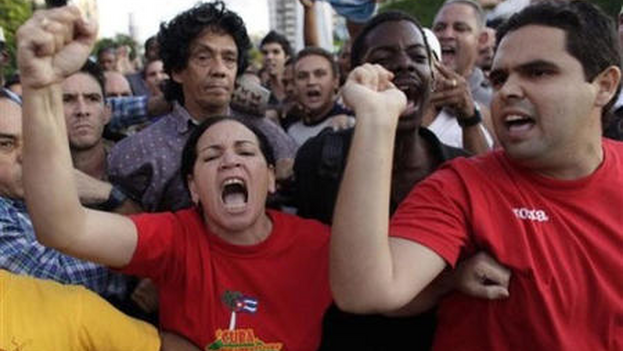
![]() 14ymedio, Reinaldo Escobar, Havana, 8 December 2020 — Although I collect dictionaries, I suffer from an incurable allergy to citing them, so I leave it to the readers to search, where they see fit (the RAE – Real Academia Española – dictionary has not yet incorporated it), the meaning that the concept of “supremacist” has had since the last century.
14ymedio, Reinaldo Escobar, Havana, 8 December 2020 — Although I collect dictionaries, I suffer from an incurable allergy to citing them, so I leave it to the readers to search, where they see fit (the RAE – Real Academia Española – dictionary has not yet incorporated it), the meaning that the concept of “supremacist” has had since the last century.
In any case, I advance that someone may deserve that epithet when they believe that the group of people to which they belong should lead or have control over other groups of people because they think they are better. The word usually has an adjective and the most used is “white” to refer to racists who consider Blacks, Latinos, Jews or humans of any other ethnic origin classified as “non-white” as inferior beings.
In Cuba, since the middle of the 20th century, the belief has been fostered that those who carry a red card in their pocket have the privilege of determining how the economy works, under what conditions it is allowed to associate, which trends of thought should be disseminated and which prohibited. They believe they have the right to decide who can travel abroad, who can be a university professor, journalist or deputy to Parliament.
Communists, those who have a red card, consider themselves the sole heirs of the best patriotic traditions, those that were harvested since those who were born here discovered that they were Cubans and not Spanish looters of an island in the Caribbean. It is true that then there were no communists and that is why a well-known official tongue twister was coined where it is established that those, today, would be like them and that they, then, would have been like those.
Unlike white supremacists, Reds are not frowned upon by the official media (where there are white supremacists there are no official media). Not only are they not punished by the laws, but they also enjoy an article in the Constitution that grants them the status of being “the superior leading political force of society and the State.” If they had spared the term “superior” it would not be so easy to mark them here as supremacists.
Historically supremacisms end badly. This is how it was in Nazi Germany when those who believed themselves Aryans tried to annihilate those who were left over. This is how it was in Rwanda when the Tutsi population was almost exterminated by the Hutus. This is how it is in the Arab world where the bloody differences between Shiites and Sunnis are based on the dispute over the inheritance of the Prophet Muhammad.
While the supremacists feel predominant and the directed silently obey, the imposed authority is exercised under a cloak of paternalistic nobility. But it is enough for a couple of voices to clash in the chorus of the feigned assents for the despotic anger, in all its ferocity, to be shown in those who claim a superiority that only works when it is irrefutable.
Today in Cuba we are seeing that anger, the child of a supposed class hatred that has no reason to exist where everyone is dispossessed. An anger fueled by a paranoid nationalism that perceives, in the political dissent of a person who loves his country, a traitor who wants to sell the country to the foreign enemy.
In the fragile fabric of a society there are threads that must never be broken because there is a risk that they can never be restored, repaired, healed.
That is perhaps the gravest danger that threatens Cuba at the moment. Worse than the shortage in the markets or the lack of liquidity of the money that is obtained through honest work; worse still, is that ideological epithets succeed in dissolving our identity.
____________
COLLABORATE WITH OUR WORK: The 14ymedio team is committed to practicing serious journalism that reflects Cuba’s reality in all its depth. Thank you for joining us on this long journey. We invite you to continue supporting us by becoming a member of 14ymedio now. Together we can continue transforming journalism in Cuba.
